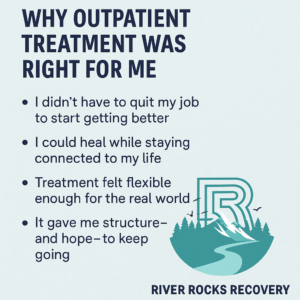When someone you love is in pain—but insists “therapy didn’t help”—what do you say?
You’ve watched them try, maybe even more than once. They showed up, said the words, maybe took the meds. And still… they’re hurting. You are too.
Here’s what most people won’t say out loud: sometimes treatment doesn’t feel like it’s working until you’re looking back.
If you’re wondering whether it’s worth encouraging another step forward, here are six surprising reasons why mental health treatment might still be the right move—even if the last round didn’t feel like a win.
1. You Get Language for What You’ve Been Carrying
It’s not about buzzwords or diagnoses—it’s about finally being able to name what hurts.
Mental health treatment often gives people a new vocabulary: not just “depression” or “anxiety,” but words like overwhelm, hypervigilance, shutdown. When someone can say “This is what’s happening to me,” it’s easier to breathe. To cope. To ask for help.
This clarity also helps loved ones understand them better. It turns confusion into conversation. And that alone can start healing long-standing miscommunication.
2. You Stop Mistaking Survival Skills for Your Personality
That sarcasm, the emotional shutdown, the way they always have to be in control—it might not be them.
Sometimes, what looks like personality is actually a defense mechanism. Therapy can gently unravel that. It helps people notice, “Oh… I’m not cold. I’m scared.” That shift? It’s where real change begins.
Mental health treatment helps people see what behaviors came from trauma, survival, or pain—and gives them space to decide what they actually want to keep. It’s not about becoming someone new. It’s about returning to who they might have been if they hadn’t been hurt.
3. It’s Not Just About the Hour in the Room
Mental health treatment isn’t confined to the office. The effects ripple.
You might notice your loved one starts sleeping more regularly. Or they’re not snapping as quickly in an argument. Or they text you back instead of ghosting for a week. Even when it feels like “nothing happened” in a session, that hour can echo through the rest of the week. A single insight can shift how someone reacts at work, with family, or even in traffic.
Over time, these ripples add up. Life doesn’t feel like a fight every day. The noise starts to quiet.
4. You Learn to Recognize Progress That Doesn’t Look Like a Breakthrough
It might not be fireworks. It might be eating lunch before 4pm. Or calling someone back.
Healing is often quiet. Therapy can teach someone to celebrate the tiny wins—the stuff they used to ignore or minimize. That kind of self-recognition builds momentum, even in rough weeks.
For families and loved ones, this shift can be frustrating if you’re looking for “big change.” But noticing and naming these moments matters. They are proof that healing is unfolding, even if it doesn’t look like what you imagined.

5. It Builds Internal Safety—Not Just Coping Skills
Coping is important. But what happens when someone finally feels safe inside their own mind?
That’s a deeper goal of treatment: not just getting through a panic attack, but rebuilding the belief that you’re not broken, not doomed, not a burden. For many, this is what makes the next chapter possible.
Internal safety makes room for self-trust. And when that happens, people can start to reconnect with others—without fear that they’re too much or not enough.
6. It Can Be the First Place They’re Allowed to Be Honest
No pleasing. No pretending. No performance. Just real.
For someone in active addiction or deep emotional pain, this might be the first time they’ve told the truth out loud—without being punished or pitied. That experience alone can change everything.
It’s not just cathartic. It’s reparative. Being heard in a safe space re-teaches the brain what connection can feel like. That’s something no self-help book or internet advice thread can replicate.
Ohio-Based and Here to Help
At River Rocks Recovery, we know mental health treatment isn’t one-size-fits-all. Especially if someone you love has tried before and left feeling disappointed or unseen. We work with people who are hesitant, hurting, and human. And we’re right here in Ohio if you’re ready to try again—on your terms.
Ready to Talk It Through?
Call River Rocks Recovery at (888) 905-6281. No pressure. Just people who care, listening.
FAQ: Mental Health Treatment at River Rocks Recovery
Q: What if my loved one says they already “tried therapy” and it didn’t work?
A: That’s more common than you think. We often work with people who feel burned out by past experiences. Our approach focuses on tailoring care to the person, not a protocol.
Q: Can treatment help if someone is also struggling with addiction?
A: Absolutely. Mental health and addiction are deeply connected. Our programs are designed to support both, whether they come in together or one shows up first.
Q: Do you offer outpatient mental health services in Ohio?
A: Yes. River Rocks Recovery offers flexible outpatient services so clients can get support while continuing to live at home and maintain other responsibilities.
Q: How soon can someone start treatment?
A: Every case is different, but we prioritize timely care. Call us at (888) 905-6281 and we’ll walk you through the next steps.
Q: What makes your approach different?
A: We start with listening. We don’t assume. And we believe in second chances—because healing isn’t linear, and no one should be written off.




























